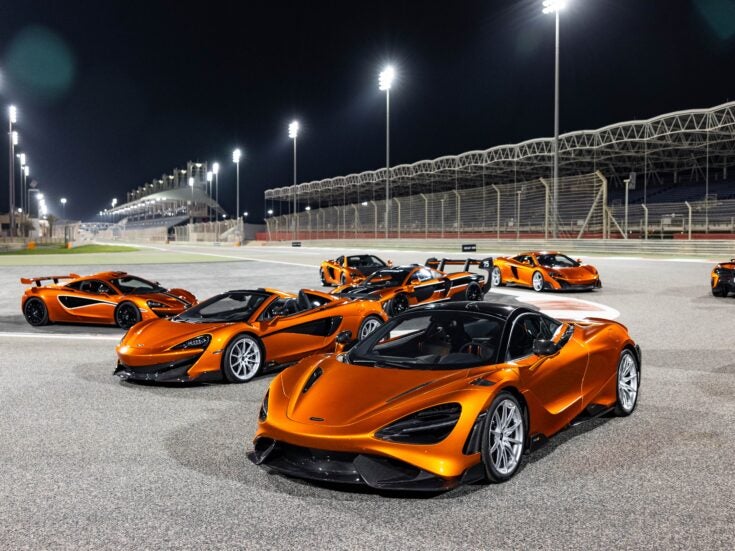
Look Who’s Torquin’
First Range Rover, then Mercedes, Porsche and now Bentley — the high-end 4×4 is the car that just won’t die. John Arlidge on the rise of the high-riding elite
YOU KNOW BENTLEY. It’s the marque for the rakish gentleman racer. Crewe’s finest, now owned by Volkswagen, makes turbo-charged two-door speed demons, the most stylish grand tourers and four-door sedans that you, not the chauffeur, want to drive. So what in the name of all things British is the blue car in the picture opposite, with Olympian dimensions and chiselled, block-of-granite styling? Is it some Frankenmonster created by German designers after one too many beers?
The EXP 9F prototype is Bentley’s first 4×4. The ‘Toff roader’, dubbed ‘Rapper’s delight’ by fans and ‘Ugly truckling’ by critics, has all-wheel drive, a six-litre W-12 engine, an eight-speed automatic transmission and 23-inch alloy wheels with racing-style central wheel nuts that are designed to evoke Bentley’s Le Mans racecars of the 1920s. It will go on sale in 2014, if, as expected, the VW board signs it off. The price? Well north of £100,000.
Bentley enjoyed record performance in 2011. It sees a limitless sales horizon — but only if it can expand into new sectors. With the low-slung two door Continental, the speedy four-door Flying Spur and bespoke Mulsanne, the only way to go is up: to build a 4×4 or SUV (sports utility vehicle). ‘We know that Bentley customers already own SUVs,’ says Wolfgang Dürheimer, Bentley’s chief executive. ‘Why should they have to shop elsewhere?’

The EXP designation has been used by Bentley for experimental prototypes since 1919 and stands for ground-breaking innovation. The truth is, the marque is playing catch-up. At the Geneva Motor Show in March, almost every car brand, even the sportiest, was showing off new 4x4s. Maserati — yes, Maserati, the ultimate, refined sporting Italian car maker — displayed its first SUV, the Kubang. Porsche revealed it will add the Macan, a compact 4×4, to its existing big biff-about Cayenne. Audi showed off its third SUV, the Q3, to add to the monstrous Q7 and stylish Q5.
Mercedes, maker of a small army of off-roaders, confirmed that its very first, the G Wagon, beloved of dictators everywhere, will come in right-hand drive for the first time to satisfy demand in the UK and Australia. BMW announced a new X vehicle, the name it gives its 4x4s. In the decade since its first SUV, the X5, was launched, it has started building an X1, X2 and X3 and there is a rumoured X7 to take on Land Rover’s Range Rover, which is still king of the hill.
Land Rover displayed its stylish, go-faster Evoque — now in a convertible model — and hawked new rugged designs for its best-loved model, the Defender, six decades after it first went on sale. Japan’s Lexus, Toyota, Infiniti and Nissan all took the dust sheets off jacked-up 4x4s and mud-pluggers. Even Mini, the resurgent small car, wants to be an SUV. At the centre of the Mini stand in Geneva was the four-wheel-drive Countryman, a car so vastly over-proportioned it is nicknamed the Mini Fatso.
And the 4×4 surge doesn’t end there. Alfa Romeo is readying an SUV in preparation for its return to the US market. Jaguar says it will make a 4×4, although Adrian Hallmark, its global brand director, prefers to call it a ‘crossover’, since it will be designed more for the urban jungle than the Amazon. Lamborghini, like Bentley owned by VW, is expected to unveil an SUV prototype at April’s Beijing Auto Show — a successor to the LM002, a Lamborghini 4×4 developed during the 1980s that was dubbed the ‘Rambo-Lambo’ for its military looks.
But hold your horsepower! None of this makes sense. Three years ago, after the oil price had soared to near-$150 a barrel and Lehman Brothers collapsed, the 4×4 — thirstier than Oliver Reed, more planet-threatening than the Deepwater Horizon — was consigned to the scrapyard. During the credit crunch, sales fell off a cliff. Land Rover was in such dire straits it begged for a government bailout. General Motors axed the Hummer.
Where did all the anti-SUV sentiment go? The man to ask is Dürheimer. Before he became Bentley boss, he masterminded the launch of the Cayenne and helped to make it Porsche’s top seller, shifting more than even the iconic 911 and doubling the firm’s profits. Consumers love the space, height and feeling of safety that SUVs deliver more than they worry about fuel consumption or carbon emissions, he says. ‘Who wants a two-room flat when you can have a very nice, big, safe house?’

Bentley’s first (and some hope last) luxury 4×4
IN EMERGING MARKETS, notably China, Russia and the Middle East, where new car sales are growing fastest, there is a cachet, rather than a stigma, attached to driving a big, tall gas-guzzler. Sales of ultra-luxury cars, including top-of-the-line SUVs, will double in China by 2015 to 8,100 vehicles, according to analysts IHS Automotive. That compares with a 21 percent increase in Europe, to 11,700, over the same period.
Since wealthy Chinese consumers have a limited experience of European brands, luxury-car makers ‘can dare to do something new’, IHS says. For all the members of the British royal family, old money milords and Perthshire pig farmers who would not be seen dead loading their wellies and picnics into anything other than a Range Rover, there are thousands of Chinese queuing up to demonstrate their new wealth and refinement in their 4×4 marque of choice.
‘A luxury SUV like a Maserati comes in handy when you need to ferry more passengers and things about,’ says Bill Liu, who runs a real estate company in Shanghai and owns five sports cars, including a $1 million Lamborghini Aventador.
Better engineering also explains the rise and rise of the SUV. Ten years ago most of them drove like barges. Now, thanks to improved suspension and stability controls, they deliver sporty performance. ‘A fast car no longer has to be a two-seater,’ says Massimo Farao, director of marketing at Maserati and Alfa Romeo. Paolo Martinelli, who developed the engine for the Kubang, used to make Formula One engines for Ferrari.
But the most important factor is dirty cash. Margins on 4x4s are the best in the business. Luxury SUVs are highly profitable because the additional space and comfort command higher prices, while development costs are kept in check by borrowing technology from other models. Bentley and Lamborghini use parts developed by the Volkswagen group, while Maserati can rely on the resources of Chrysler, its sister company (the Kubang uses the same underpinnings as Chrysler’s Jeep Grand Cherokee).
In just a few years, upscale SUVs have gone from threatened species to what John Edwards, Land Rover’s global brand director, calls ‘luxury goods in the truest sense. They are brilliantly engineered and designed and built to last. They don’t change every season. They represent luxury with a purpose.’ Bentley hopes the high-riding super-rich will feel the same way. Its business case for its giant SUV is based on annual sales of 3,500 a year — a significant leap for a company that shifts about 7,000 cars a year today.








